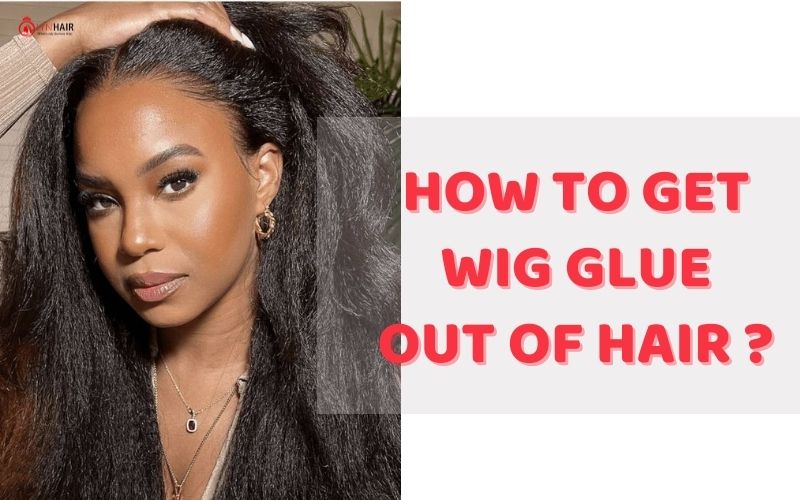Uncategorized
How To Get Wig Glue Out Of Hair ?
Getting glue stuck in your hair can be a frustrating and challenging ordeal, but fear not—there are effective methods to safely and efficiently remove glue from your hair. Whether it’s adhesive residue from extensions, wig glue, or any other sticky mishap, this article will guide you through the process of how to get wig glue out of hair with simple steps.
1. How to remove wig glue: 5 easy steps
Step 1: Melting the wig glue using an alcohol-based solution
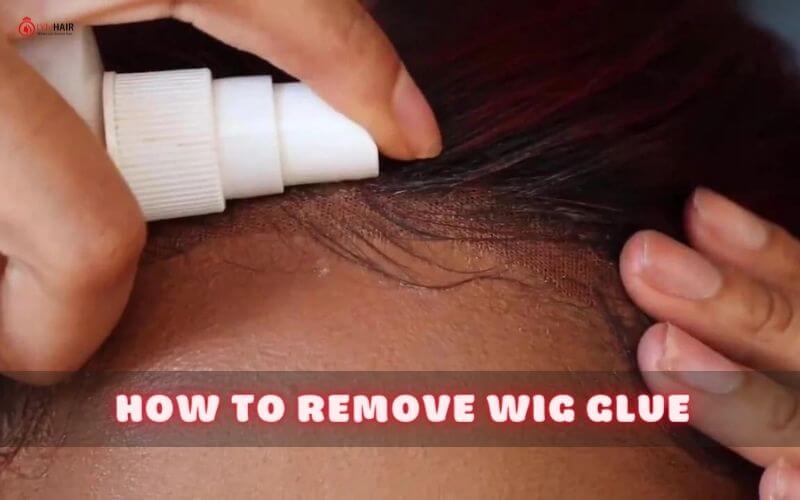
Start by applying an alcohol-based wig adhesive remover or rubbing alcohol to the glued area. You can use a cotton ball or pad to apply the solution. Allow it to sit for a few minutes to soften and dissolve the glue. This process will make the glue easier to remove.
Step 2: Pull The Lace Frontal Up
Carefully lift the lace frontal or wig away from your head. Begin at one edge and slowly peel it back. Take your time during this step to avoid pulling on your natural hair or damaging the lace frontal. If you encounter resistance, apply a bit more of the alcohol-based solution and wait a little longer before trying to lift the lace.
Step 3: Remove Your Wig Cap
If you’re wearing a wig cap underneath the wig, gently remove it. This step exposes your natural hair and the remaining glue on your scalp.
Step 4: Remove Wig Glue
To remove any residual glue from your hair and scalp, use a gentle approach. You can choose from several methods:
Use a wig adhesive remover: Apply the remover to the glued areas and let it sit for a few minutes. Gently rub or comb the glue out, working from the edges towards the center. Be patient and avoid pulling on your hair.
Use oil (e.g., coconut or olive oil): Apply the oil generously to the areas with remaining glue and let it sit. The oil will help break down the adhesive. Gently rub or comb the glue out, adding more oil if needed.
Use a specialized glue removal product: Follow the product’s instructions for application and removal.
Step 5: Apply Hair Conditioner to Lock in Moisture
After successfully removing the glue, it’s essential to maintain your hair’s moisture. Apply a hair conditioner to the cleaned areas and your natural hair to lock in moisture and keep your hair healthy. Lastly, remember to leave the conditioner on for a few minutes before rinsing it away.
Throughout the process, be gentle to avoid damaging your natural hair and scalp.
2. What can you use to remove Lace Wig Glue instead of alcohol?
Acetone
Acetone is effective at removing wig glue. Apply it to the glued area and let it sit for about a minute before gently combing out the glue. Be cautious as acetone can be harsh on the skin and should not be used for an extended period, especially by pregnant individuals.
Soap and Water
Soak the glued wig in warm soapy water. Gently dab the soapy water onto the glued sections and allow it to sit for a few minutes to loosen the adhesive bond. Massage the glued areas to break down the glue, then rinse the wig under lukewarm running water and let it air dry.
Olive oil or coconut oil
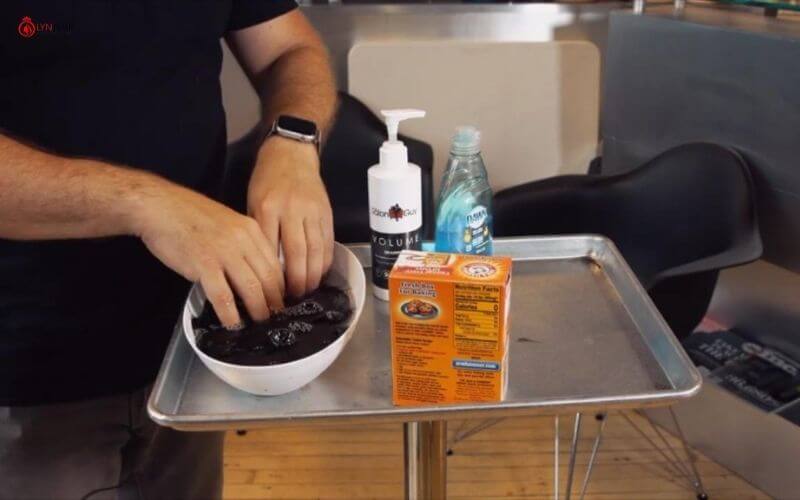
These natural oils can be gentle on the skin. Apply the oil to the glued area and wipe away the glue with a paper napkin or cloth. Lift the lace gently to let the oil penetrate and dissolve the glue.
Vaseline
Apply Vaseline to the glued area and let it sit for several minutes. Wipe it away with a damp towel. Vaseline’s emollient properties help dissolve the glue gradually.
Baby oil
Baby oil can be used similarly to olive or coconut oil. Apply it to the glued portions with a cotton ball, massage it gently into your scalp, and then wash your hair with warm water.
Warm water mixture with baking soda
Mix a small amount of baking soda or salt with warm water to create a solution that aids in breaking down the glue binding. Spray this mixture onto your hairline, wear a shower cap, and leave it on for 10 minutes before washing.
Use a Wig Cap
If you’re having difficulty removing glue, try wearing a wig cap over the glued area for a few minutes. This can help loosen the glue, making it easier to remove.
3. What Is The Easiest Way To Get Wig Glue Out of hair?
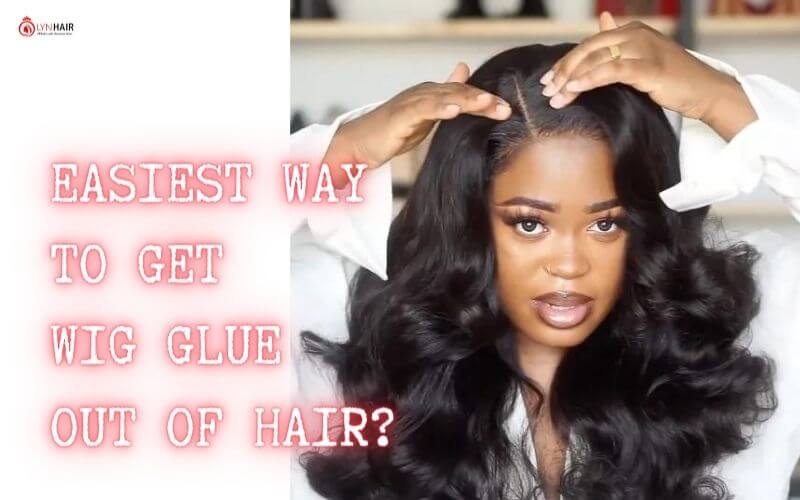
According to hairstylists, the easiest way to remove hair glue is by using oil. First, choose your preferred oil, as oils are good at breaking down glue. Apply the oil to dry hair, as wet hair can tangle and complicate the process. It’s also best to remove glue from slightly greasy or oily hair because natural scalp oils help soften the glue.
Once the oil is on your hair, let it sit for 10 to 30 minutes. Afterward, gently massage the area where the glue is to see if it’s ready to come off. If not, add more oil and wait a bit longer. When the glue has softened, use a wide-tooth comb and add a creamy conditioner to help the track or extension slide out easily.
The key here is patience – don’t rush. If you’re in a hurry, it’s better to wait until you have time for the oil to work its magic and make glue removal easier and less damaging.
4. What Shouldn’t You Use To Remove Wig Glue?
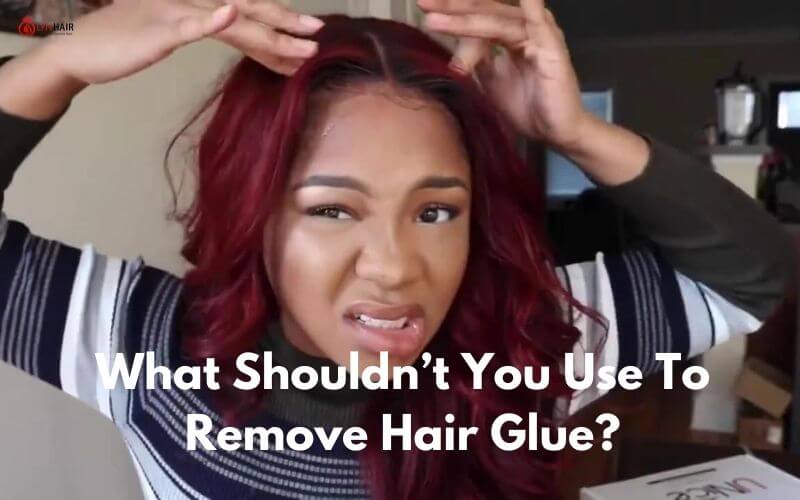
When removing hair glue, it’s essential to know what not to use to avoid potential harm to your hair and scalp. Here are some substances and methods you should avoid when removing hair glue:
Petroleum Jelly (Vaseline): Avoid using petroleum jelly to remove hair glue. It can be difficult to wash out once you reach the shampoo stage and may leave your hair and scalp feeling greasy.
Rubbing Alcohol: While some people use rubbing alcohol to remove hair glue, it’s not recommended due to its potential to irritate the skin along the hairline. Alcohol can also be drying, particularly on delicate baby hairs.
Clarifying Shampoo: Avoid using clarifying shampoos during the glue removal process. These shampoos are designed to break down dirt and oil and may make your hair too clean, making it challenging for the glue to emulsify. Clarifying shampoos can also be drying, especially when used after alcohol.
5. How To Take Care Of Hair After Removal Wig Glue?
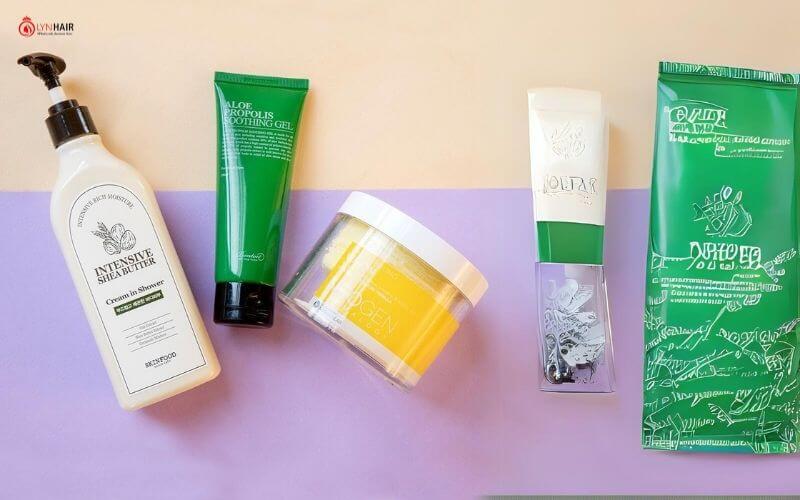
Caring for your hair post-extension or wig removal is essential to maintain its health and vitality. Start by gently detangling your hair using a wide-toothed comb or brush, working from the tips to the roots to prevent breakage. Deep conditioning is crucial to restore moisture and nourishment. Apply a high-quality deep conditioner or hair mask, leaving it on for the recommended time or overnight for intensive care. Opt for a sulfate-free shampoo to cleanse your hair gently and remove any adhesive or residue. After washing, apply a leave-in conditioner or lightweight hair serum to lock in moisture, paying special attention to dry or damaged areas.
A trim may be beneficial to remove split ends and maintain overall hair health. Choose low-manipulation hairstyles to minimize stress and breakage, avoiding tight styles and excessive heat. Maintain a balanced diet and hydration for healthy hair growth, and establish a regular hair care routine to keep your hair looking its best.
6. Plus – Tips need to pay attention when remove lace wig glue
When removing lace wig glue, there are several important tips to keep in mind for a safe and effective process:
Tie Your Hair
Before you begin, tie up your natural hair or secure it away from the area where you’ll be working. This prevents your hair from getting in the way during the removal process.
Do a Skin Test in Advance
It’s a good practice to perform a skin test before using any adhesive remover or solvent. Apply a small amount to a small, inconspicuous area of skin to check for any adverse reactions or allergies.
Remove the Wig from Back to Front
When detaching the lace wig, start at the back and work your way towards the front. This gradual approach helps avoid any sudden tugging or discomfort.
Be Careful and Patient
Patience is key when removing lace wig glue. Take your time and be gentle to minimize any potential damage to your natural hair or scalp.
Remember to Clean Your Skin
After the wig is removed, thoroughly clean your skin to remove any remaining adhesive residue. Use a gentle cleanser or adhesive remover specifically designed for skin.
Wash and Clean Your Wig
Once the glue is removed, it’s essential to wash and clean your lace wig. Follow the manufacturer’s instructions for cleaning and maintaining your wig to ensure it remains in good condition for future use.
Conclusion
In summary, knowing how to remove glue from your hair can save you from hair-raising dilemmas. Remember, it’s essential to tailor your removal method to the type of glue and seek professional advice if you’re uncertain about the process. With the guidance provided in this article, you’ll be well-equipped to handle any sticky situation and keep your hair looking its best.
𝑭𝒐𝒓 𝒎𝒐𝒓𝒆 𝒊𝒏𝒇𝒐𝒓𝒎𝒂𝒕𝒊𝒐𝒏, 𝒄𝒐𝒏𝒕𝒂𝒄𝒕:
Whatsapp: +84.936.085.069
Follow us on Instagram: @lyn.hair_official and @lynhair.factory
Website: lynhair.com

